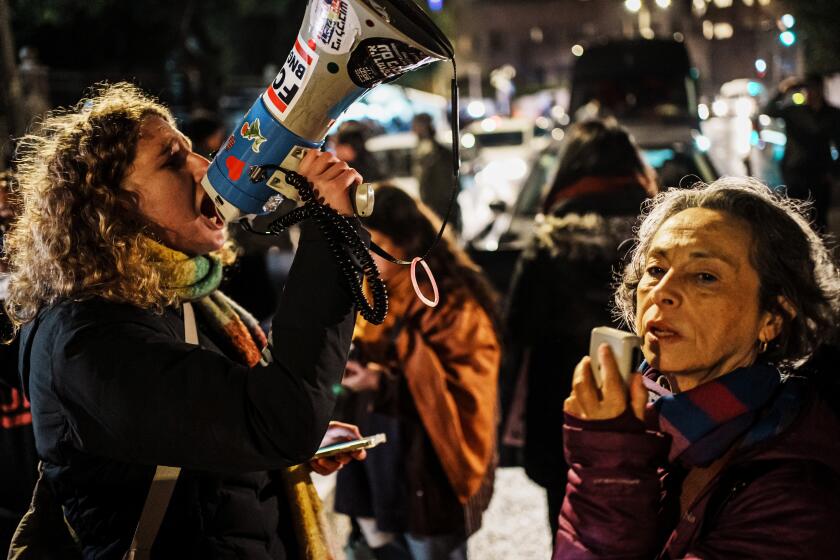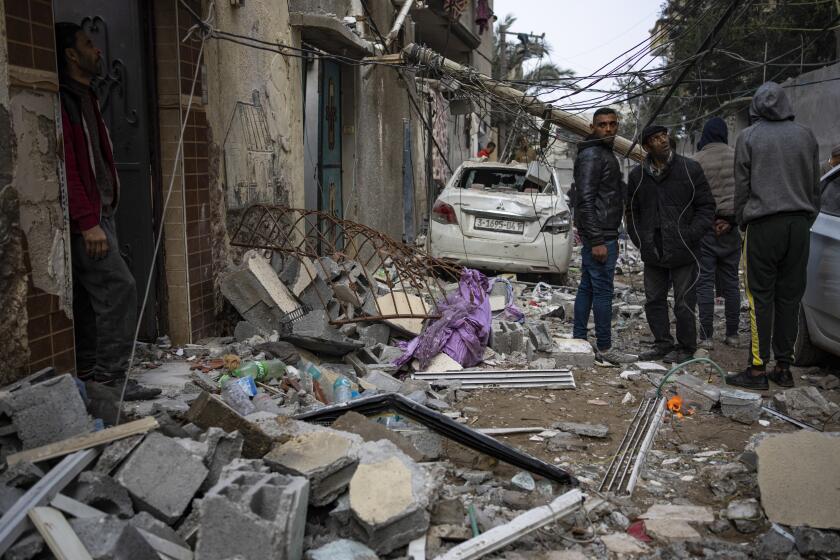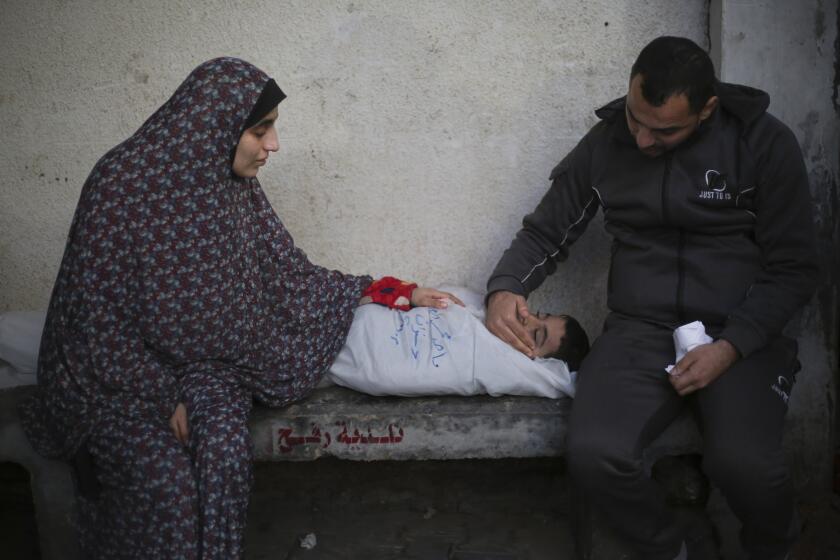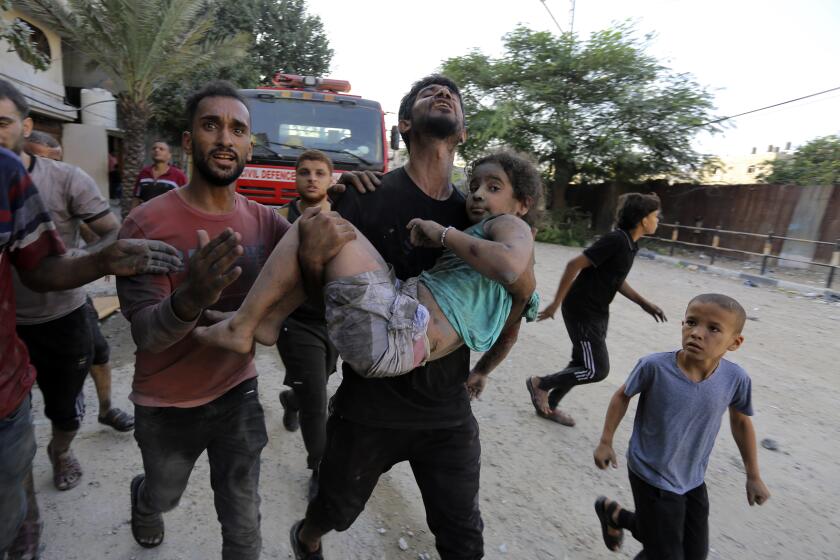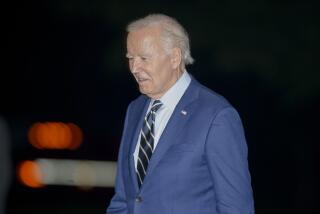Biden says ‘key elements’ of a Gaza deal are on the table as he meets with Jordan’s King Abdullah

- Share via
WASHINGTON — Declaring that “every innocent life lost in Gaza is a tragedy,” President Biden welcomed Jordan’s King Abdullah II to the White House on Monday for talks on how to end the months-long war and plan for what comes afterward.
The meeting with Abdullah comes as Biden and his aides are working to broker another pause in Israel’s war against Hamas in order to send humanitarian aid and supplies into the region and get hostages out. The White House faces growing criticism from Arab Americans and others over the administration’s continued support for Israel in the face of rising casualties in Gaza since Hamas launched its Oct, 7 attack on Israel.
“The key elements of the deal are on the table,” Biden said alongside the king, though “there are gaps that remain.” He said the U.S. would do “everything possible” to make an agreement happen: a pause to fighting for at least six weeks and the release of the remaining hostages held by Hamas.
A senior U.S. administration official said Sunday that after weeks of shuttle diplomacy and phone conversations, a framework was essentially in place for a deal. The official said Israeli military pressure on Hamas in Khan Yunis over the last several weeks has helped bring the militant group closer to accepting an agreement.
Abdullah said Biden’s leadership was “key to addressing this conflict,” as he raised the plight of the tens of thousands of civilians killed and wounded in the fighting.
Teenage friends Angelina, who is Palestinian, and Adar, who is Jewish Israeli, talk about the Hamas attacks on Israel and Israel’s war on Gaza. ‘It’s OK to disagree.’
“We need a lasting cease-fire now,” the king said. “This war must end.”
Jordan and other Arab states have been highly critical of Israel’s actions and have eschewed public support for long-term planning over what happens next, arguing that the fighting must end before such discussions can begin. They have been demanding a cease-fire since mid-October as civilian casualties began to skyrocket.
Biden’s stance marks a subtle but notable break for the president, who has continued to oppose a permanent cease-fire. His administration has insisted that Hamas not retain political or military control over Gaza after the war — a key objective of the Israeli operation to prevent a repeat of the Oct. 7 attack that killed about 1,200 Israelis and saw about 240 taken hostage.
More than three months into the Israel-Hamas war, the families of hostages held in Gaza have grown disillusioned with Israel’s military operations.
Biden repeated his warning that Israel must not launch a full-scale attack on Rafah, the last major holdout of Hamas where more than 1.3 million people are sheltering unless it devises plans to safeguard the civilians there from harm’s way. Earlier Monday, National Security Council spokesman John F. Kirby acknowledged that there were “legitimate military targets” for Israel in Rafah, but said the Israelis must ensure their operations are designed to protect the lives of innocent civilians. Officials have said the U.S. is not sure there is a feasible plan to relocate civilians out of Rafah to allow military operations to take place.
Biden, who has held out hope for a two-state solution to the Israeli-Palestinian conflict, added that he and the king discussed the need for the Palestinian Authority, which has some control over parts of the West Bank, to “urgently reform” to be ready to assume some authorities in Gaza if Hamas is removed from power. “They must prepare to build a state that accepts peace, does not harbor terrorist groups like Hamas and Islamic Jihad,” Biden said.
Netanyahu says he has ordered the military to prepare a plan for the evacuation of the southern Gaza town of Rafah ahead of an expected ground invasion.
Abdullah insisted that “separation of the West Bank and Gaza cannot be accepted.”
Earlier Monday, the president, joined by First Lady Jill Biden, welcomed the king, Queen Rania and Crown Prince Hussein at the White House before the leaders met.
It was the first meeting between the allies since three American troops were killed last month in a drone strike against a U.S. base in Jordan. Biden blamed Iran-backed militias for the deaths, the first for the U.S. after months of strikes by such groups against American forces across the Middle East since the start of the Israel-Hamas war.
Israeli forces rescue hostages, storming a heavily guarded apartment in Rafah; airstrikes giving cover kill at least 67 Palestinians, Gaza health officials say.
Biden had planned to visit Jordan during his trip to Israel in October shortly after the attack by Hamas, but the trip was scrapped. On his way home from Israel, Biden announced that he’d helped broker the first deal to pause fighting temporarily and to open the crossing in Rafah to humanitarian aid.
In the months since, members of his administration have made repeated trips to the region to engage with leaders there.
Civilian deaths in Gaza have fueled global outrage. But many Israelis, still raw from Hamas’ Oct. 7 attack, have scant interest in the war’s toll on Palestinians.
More to Read
Sign up for Essential California
The most important California stories and recommendations in your inbox every morning.
You may occasionally receive promotional content from the Los Angeles Times.

